Analysis of Toshiba's Accounting Scandal and Its Business Impact
VerifiedAdded on 2023/05/08
|14
|3316
|71
Report
AI Summary
This report provides a comprehensive review and analysis of the Toshiba accounting scandal. It begins with background information on Toshiba, including its history, key business areas, and organizational structure. The report then summarizes the key findings of the scandal, detailing the fraudulent accounting practices and their consequences. It explores relevant theoretical frameworks such as agency theory, stakeholder theory, and the fraud triangle to understand the causes and implications of the scandal. Furthermore, it examines the company's corporate culture, management practices, and the impact on its reputation and financial performance. The report also discusses potential future performance, challenges, and strategies for Toshiba to regain its competitive advantage and overcome the negative impact of the scandal. The report concludes with a summary of the main findings and the importance of ethical behavior and corporate governance for long-term business success.

"A load of tosh?" Toshiba's accounting scandal
Article Review
APRIL 3, 2023
Article Review
APRIL 3, 2023
Paraphrase This Document
Need a fresh take? Get an instant paraphrase of this document with our AI Paraphraser
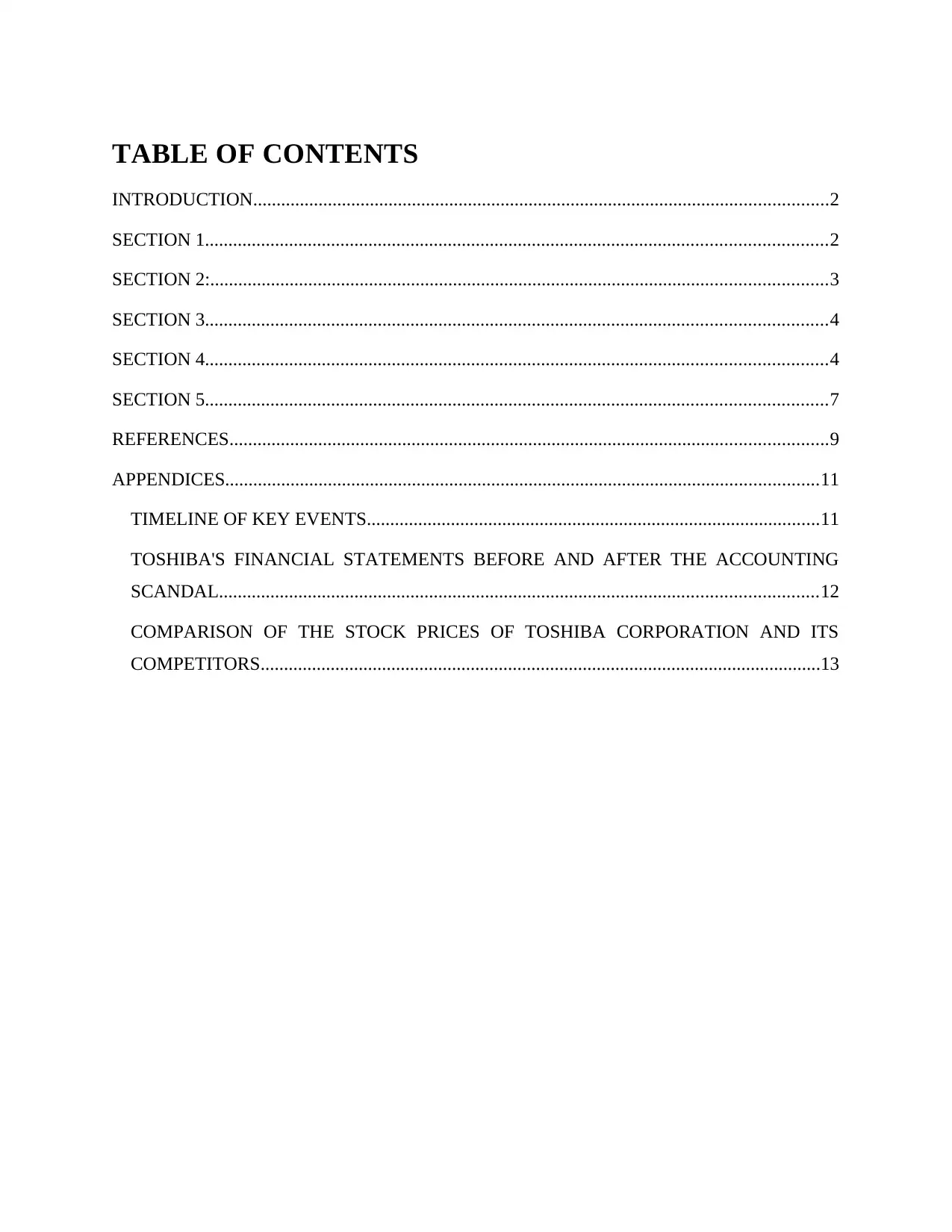
TABLE OF CONTENTS
INTRODUCTION...........................................................................................................................2
SECTION 1.....................................................................................................................................2
SECTION 2:....................................................................................................................................3
SECTION 3.....................................................................................................................................4
SECTION 4.....................................................................................................................................4
SECTION 5.....................................................................................................................................7
REFERENCES................................................................................................................................9
APPENDICES...............................................................................................................................11
TIMELINE OF KEY EVENTS.................................................................................................11
TOSHIBA'S FINANCIAL STATEMENTS BEFORE AND AFTER THE ACCOUNTING
SCANDAL................................................................................................................................12
COMPARISON OF THE STOCK PRICES OF TOSHIBA CORPORATION AND ITS
COMPETITORS........................................................................................................................13
INTRODUCTION...........................................................................................................................2
SECTION 1.....................................................................................................................................2
SECTION 2:....................................................................................................................................3
SECTION 3.....................................................................................................................................4
SECTION 4.....................................................................................................................................4
SECTION 5.....................................................................................................................................7
REFERENCES................................................................................................................................9
APPENDICES...............................................................................................................................11
TIMELINE OF KEY EVENTS.................................................................................................11
TOSHIBA'S FINANCIAL STATEMENTS BEFORE AND AFTER THE ACCOUNTING
SCANDAL................................................................................................................................12
COMPARISON OF THE STOCK PRICES OF TOSHIBA CORPORATION AND ITS
COMPETITORS........................................................................................................................13
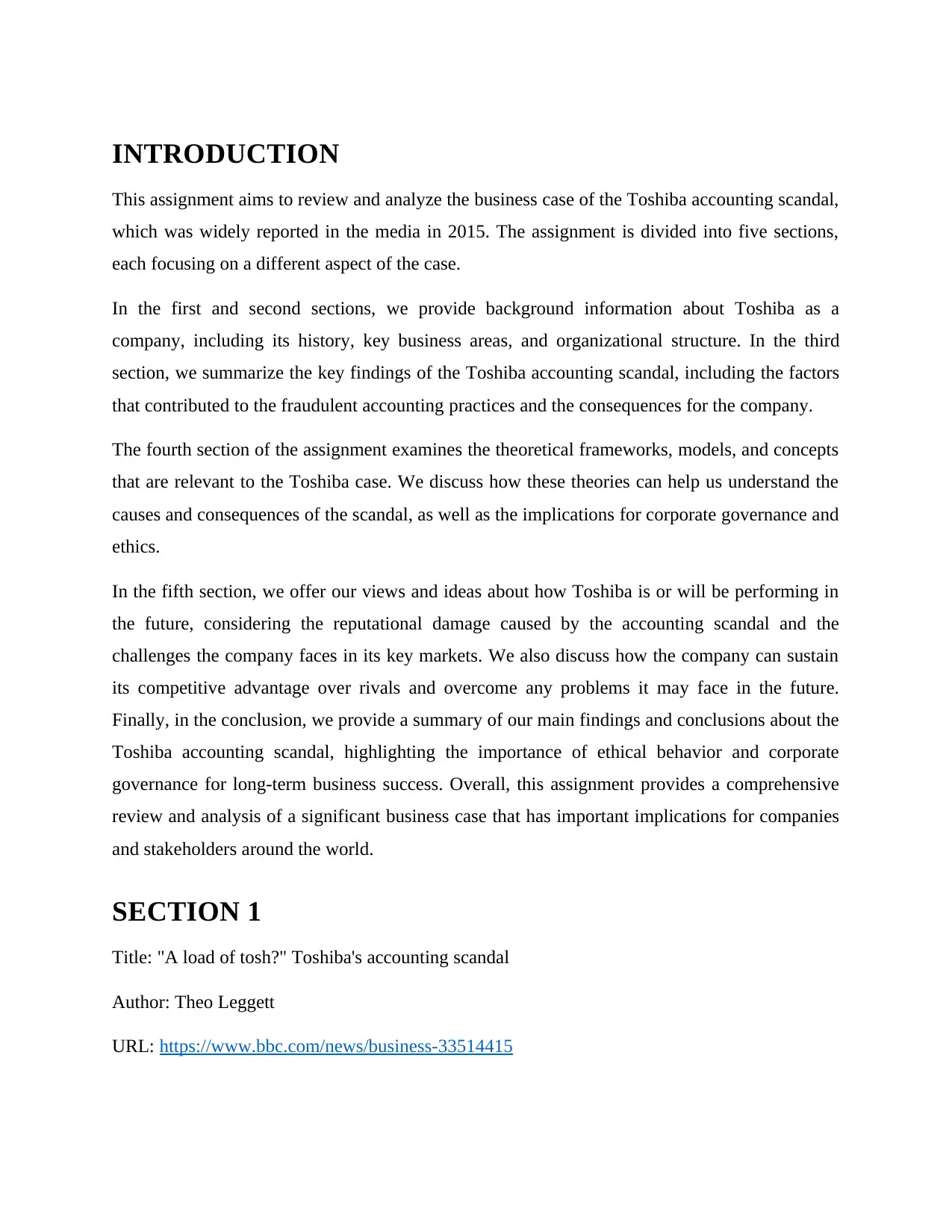
INTRODUCTION
This assignment aims to review and analyze the business case of the Toshiba accounting scandal,
which was widely reported in the media in 2015. The assignment is divided into five sections,
each focusing on a different aspect of the case.
In the first and second sections, we provide background information about Toshiba as a
company, including its history, key business areas, and organizational structure. In the third
section, we summarize the key findings of the Toshiba accounting scandal, including the factors
that contributed to the fraudulent accounting practices and the consequences for the company.
The fourth section of the assignment examines the theoretical frameworks, models, and concepts
that are relevant to the Toshiba case. We discuss how these theories can help us understand the
causes and consequences of the scandal, as well as the implications for corporate governance and
ethics.
In the fifth section, we offer our views and ideas about how Toshiba is or will be performing in
the future, considering the reputational damage caused by the accounting scandal and the
challenges the company faces in its key markets. We also discuss how the company can sustain
its competitive advantage over rivals and overcome any problems it may face in the future.
Finally, in the conclusion, we provide a summary of our main findings and conclusions about the
Toshiba accounting scandal, highlighting the importance of ethical behavior and corporate
governance for long-term business success. Overall, this assignment provides a comprehensive
review and analysis of a significant business case that has important implications for companies
and stakeholders around the world.
SECTION 1
Title: "A load of tosh?" Toshiba's accounting scandal
Author: Theo Leggett
URL: https://www.bbc.com/news/business-33514415
This assignment aims to review and analyze the business case of the Toshiba accounting scandal,
which was widely reported in the media in 2015. The assignment is divided into five sections,
each focusing on a different aspect of the case.
In the first and second sections, we provide background information about Toshiba as a
company, including its history, key business areas, and organizational structure. In the third
section, we summarize the key findings of the Toshiba accounting scandal, including the factors
that contributed to the fraudulent accounting practices and the consequences for the company.
The fourth section of the assignment examines the theoretical frameworks, models, and concepts
that are relevant to the Toshiba case. We discuss how these theories can help us understand the
causes and consequences of the scandal, as well as the implications for corporate governance and
ethics.
In the fifth section, we offer our views and ideas about how Toshiba is or will be performing in
the future, considering the reputational damage caused by the accounting scandal and the
challenges the company faces in its key markets. We also discuss how the company can sustain
its competitive advantage over rivals and overcome any problems it may face in the future.
Finally, in the conclusion, we provide a summary of our main findings and conclusions about the
Toshiba accounting scandal, highlighting the importance of ethical behavior and corporate
governance for long-term business success. Overall, this assignment provides a comprehensive
review and analysis of a significant business case that has important implications for companies
and stakeholders around the world.
SECTION 1
Title: "A load of tosh?" Toshiba's accounting scandal
Author: Theo Leggett
URL: https://www.bbc.com/news/business-33514415
⊘ This is a preview!⊘
Do you want full access?
Subscribe today to unlock all pages.

Trusted by 1+ million students worldwide
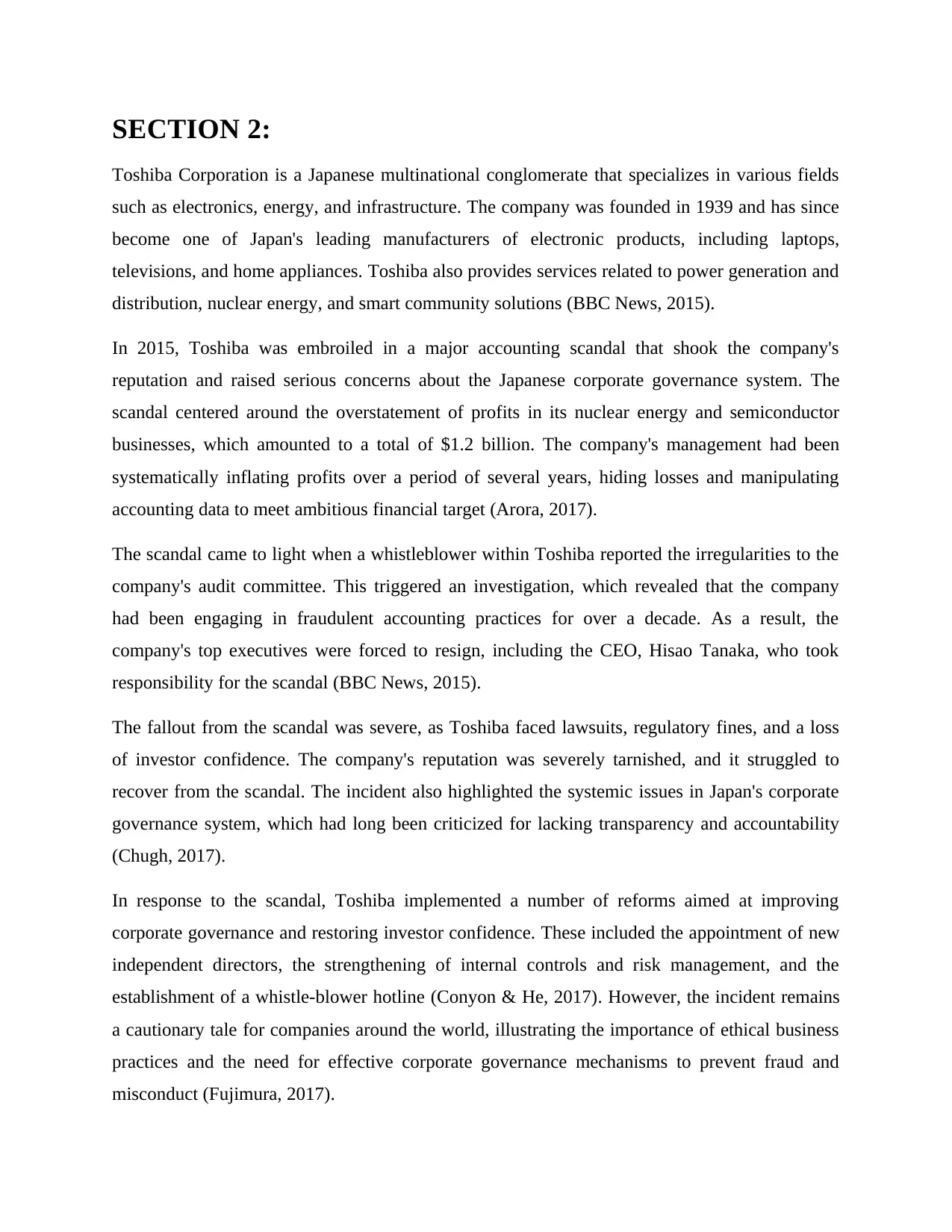
SECTION 2:
Toshiba Corporation is a Japanese multinational conglomerate that specializes in various fields
such as electronics, energy, and infrastructure. The company was founded in 1939 and has since
become one of Japan's leading manufacturers of electronic products, including laptops,
televisions, and home appliances. Toshiba also provides services related to power generation and
distribution, nuclear energy, and smart community solutions (BBC News, 2015).
In 2015, Toshiba was embroiled in a major accounting scandal that shook the company's
reputation and raised serious concerns about the Japanese corporate governance system. The
scandal centered around the overstatement of profits in its nuclear energy and semiconductor
businesses, which amounted to a total of $1.2 billion. The company's management had been
systematically inflating profits over a period of several years, hiding losses and manipulating
accounting data to meet ambitious financial target (Arora, 2017).
The scandal came to light when a whistleblower within Toshiba reported the irregularities to the
company's audit committee. This triggered an investigation, which revealed that the company
had been engaging in fraudulent accounting practices for over a decade. As a result, the
company's top executives were forced to resign, including the CEO, Hisao Tanaka, who took
responsibility for the scandal (BBC News, 2015).
The fallout from the scandal was severe, as Toshiba faced lawsuits, regulatory fines, and a loss
of investor confidence. The company's reputation was severely tarnished, and it struggled to
recover from the scandal. The incident also highlighted the systemic issues in Japan's corporate
governance system, which had long been criticized for lacking transparency and accountability
(Chugh, 2017).
In response to the scandal, Toshiba implemented a number of reforms aimed at improving
corporate governance and restoring investor confidence. These included the appointment of new
independent directors, the strengthening of internal controls and risk management, and the
establishment of a whistle-blower hotline (Conyon & He, 2017). However, the incident remains
a cautionary tale for companies around the world, illustrating the importance of ethical business
practices and the need for effective corporate governance mechanisms to prevent fraud and
misconduct (Fujimura, 2017).
Toshiba Corporation is a Japanese multinational conglomerate that specializes in various fields
such as electronics, energy, and infrastructure. The company was founded in 1939 and has since
become one of Japan's leading manufacturers of electronic products, including laptops,
televisions, and home appliances. Toshiba also provides services related to power generation and
distribution, nuclear energy, and smart community solutions (BBC News, 2015).
In 2015, Toshiba was embroiled in a major accounting scandal that shook the company's
reputation and raised serious concerns about the Japanese corporate governance system. The
scandal centered around the overstatement of profits in its nuclear energy and semiconductor
businesses, which amounted to a total of $1.2 billion. The company's management had been
systematically inflating profits over a period of several years, hiding losses and manipulating
accounting data to meet ambitious financial target (Arora, 2017).
The scandal came to light when a whistleblower within Toshiba reported the irregularities to the
company's audit committee. This triggered an investigation, which revealed that the company
had been engaging in fraudulent accounting practices for over a decade. As a result, the
company's top executives were forced to resign, including the CEO, Hisao Tanaka, who took
responsibility for the scandal (BBC News, 2015).
The fallout from the scandal was severe, as Toshiba faced lawsuits, regulatory fines, and a loss
of investor confidence. The company's reputation was severely tarnished, and it struggled to
recover from the scandal. The incident also highlighted the systemic issues in Japan's corporate
governance system, which had long been criticized for lacking transparency and accountability
(Chugh, 2017).
In response to the scandal, Toshiba implemented a number of reforms aimed at improving
corporate governance and restoring investor confidence. These included the appointment of new
independent directors, the strengthening of internal controls and risk management, and the
establishment of a whistle-blower hotline (Conyon & He, 2017). However, the incident remains
a cautionary tale for companies around the world, illustrating the importance of ethical business
practices and the need for effective corporate governance mechanisms to prevent fraud and
misconduct (Fujimura, 2017).
Paraphrase This Document
Need a fresh take? Get an instant paraphrase of this document with our AI Paraphraser
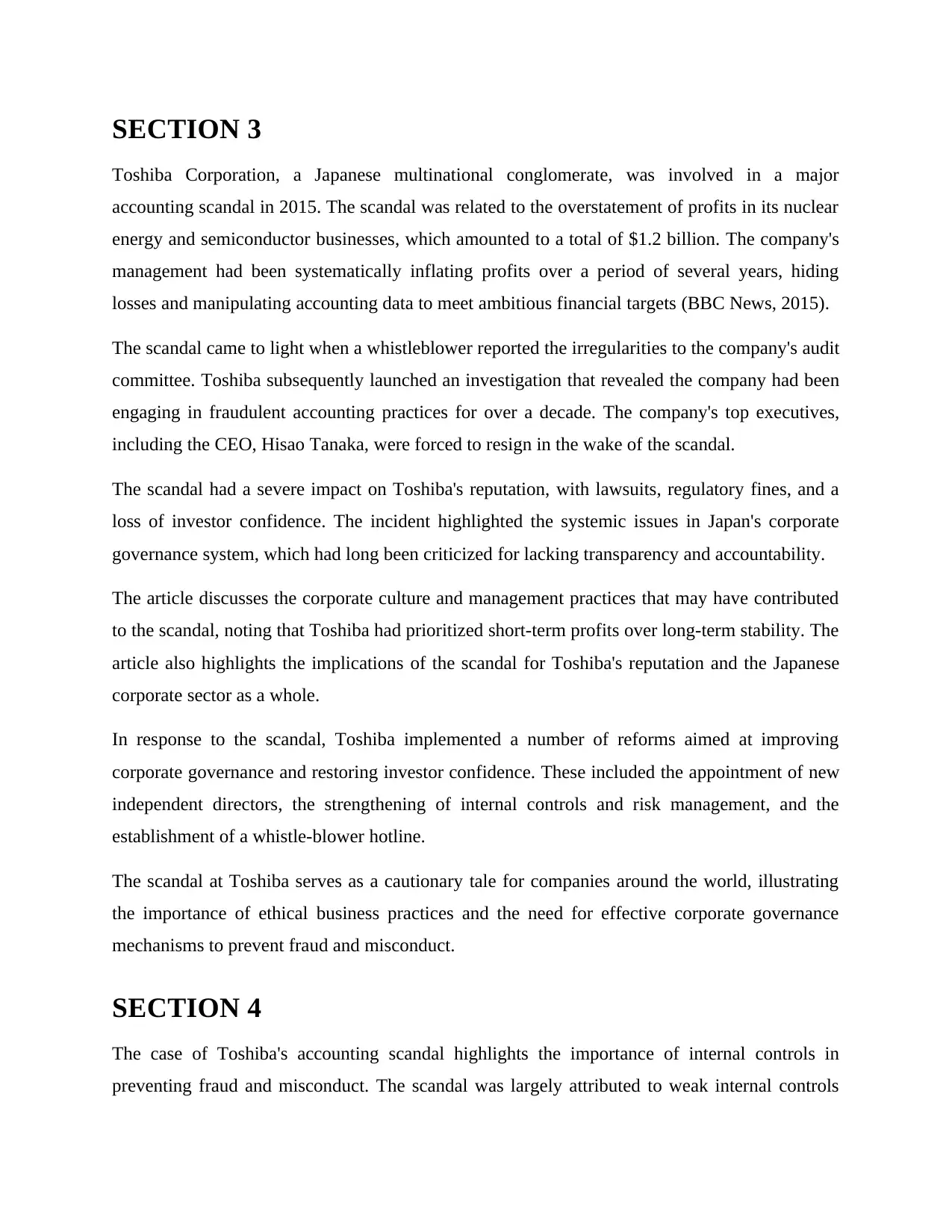
SECTION 3
Toshiba Corporation, a Japanese multinational conglomerate, was involved in a major
accounting scandal in 2015. The scandal was related to the overstatement of profits in its nuclear
energy and semiconductor businesses, which amounted to a total of $1.2 billion. The company's
management had been systematically inflating profits over a period of several years, hiding
losses and manipulating accounting data to meet ambitious financial targets (BBC News, 2015).
The scandal came to light when a whistleblower reported the irregularities to the company's audit
committee. Toshiba subsequently launched an investigation that revealed the company had been
engaging in fraudulent accounting practices for over a decade. The company's top executives,
including the CEO, Hisao Tanaka, were forced to resign in the wake of the scandal.
The scandal had a severe impact on Toshiba's reputation, with lawsuits, regulatory fines, and a
loss of investor confidence. The incident highlighted the systemic issues in Japan's corporate
governance system, which had long been criticized for lacking transparency and accountability.
The article discusses the corporate culture and management practices that may have contributed
to the scandal, noting that Toshiba had prioritized short-term profits over long-term stability. The
article also highlights the implications of the scandal for Toshiba's reputation and the Japanese
corporate sector as a whole.
In response to the scandal, Toshiba implemented a number of reforms aimed at improving
corporate governance and restoring investor confidence. These included the appointment of new
independent directors, the strengthening of internal controls and risk management, and the
establishment of a whistle-blower hotline.
The scandal at Toshiba serves as a cautionary tale for companies around the world, illustrating
the importance of ethical business practices and the need for effective corporate governance
mechanisms to prevent fraud and misconduct.
SECTION 4
The case of Toshiba's accounting scandal highlights the importance of internal controls in
preventing fraud and misconduct. The scandal was largely attributed to weak internal controls
Toshiba Corporation, a Japanese multinational conglomerate, was involved in a major
accounting scandal in 2015. The scandal was related to the overstatement of profits in its nuclear
energy and semiconductor businesses, which amounted to a total of $1.2 billion. The company's
management had been systematically inflating profits over a period of several years, hiding
losses and manipulating accounting data to meet ambitious financial targets (BBC News, 2015).
The scandal came to light when a whistleblower reported the irregularities to the company's audit
committee. Toshiba subsequently launched an investigation that revealed the company had been
engaging in fraudulent accounting practices for over a decade. The company's top executives,
including the CEO, Hisao Tanaka, were forced to resign in the wake of the scandal.
The scandal had a severe impact on Toshiba's reputation, with lawsuits, regulatory fines, and a
loss of investor confidence. The incident highlighted the systemic issues in Japan's corporate
governance system, which had long been criticized for lacking transparency and accountability.
The article discusses the corporate culture and management practices that may have contributed
to the scandal, noting that Toshiba had prioritized short-term profits over long-term stability. The
article also highlights the implications of the scandal for Toshiba's reputation and the Japanese
corporate sector as a whole.
In response to the scandal, Toshiba implemented a number of reforms aimed at improving
corporate governance and restoring investor confidence. These included the appointment of new
independent directors, the strengthening of internal controls and risk management, and the
establishment of a whistle-blower hotline.
The scandal at Toshiba serves as a cautionary tale for companies around the world, illustrating
the importance of ethical business practices and the need for effective corporate governance
mechanisms to prevent fraud and misconduct.
SECTION 4
The case of Toshiba's accounting scandal highlights the importance of internal controls in
preventing fraud and misconduct. The scandal was largely attributed to weak internal controls
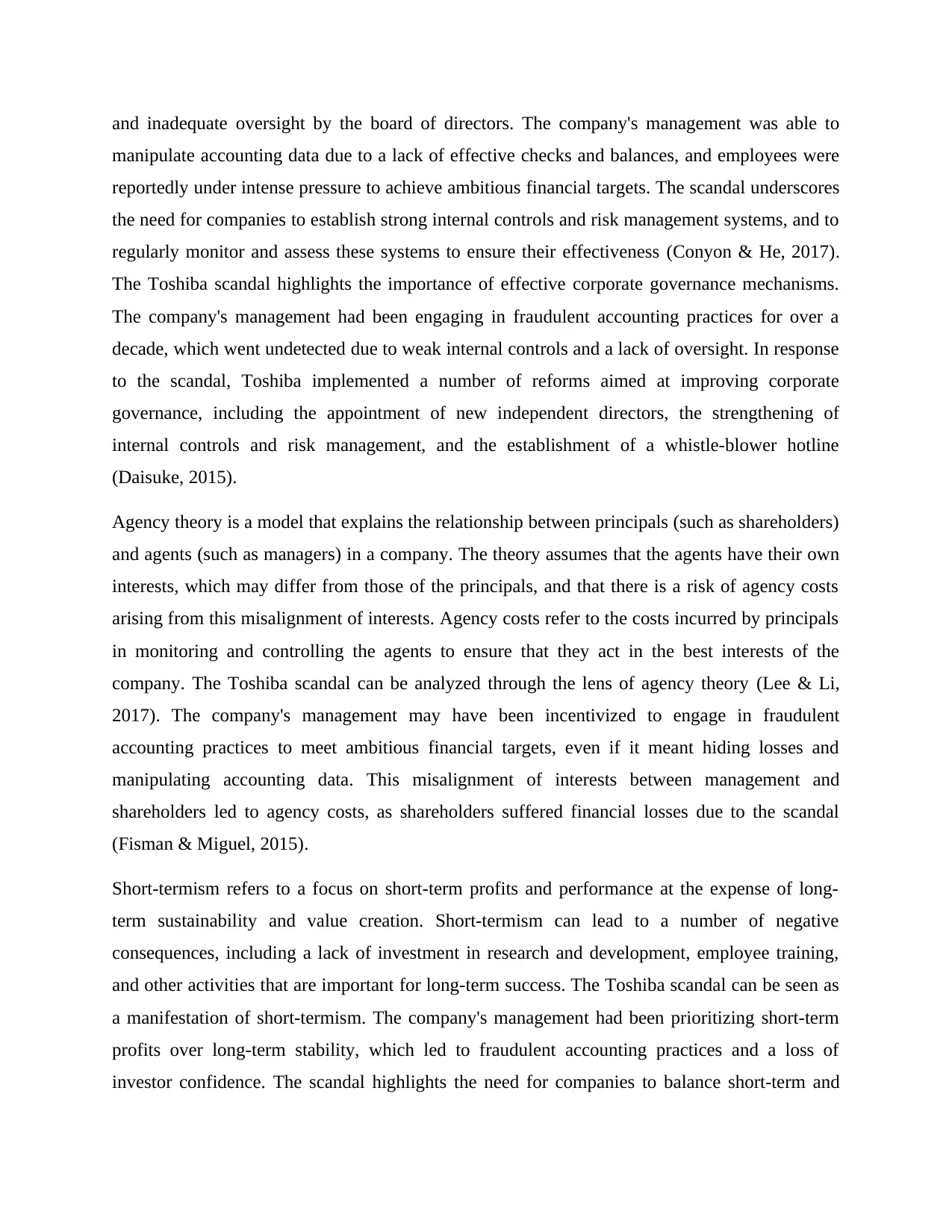
and inadequate oversight by the board of directors. The company's management was able to
manipulate accounting data due to a lack of effective checks and balances, and employees were
reportedly under intense pressure to achieve ambitious financial targets. The scandal underscores
the need for companies to establish strong internal controls and risk management systems, and to
regularly monitor and assess these systems to ensure their effectiveness (Conyon & He, 2017).
The Toshiba scandal highlights the importance of effective corporate governance mechanisms.
The company's management had been engaging in fraudulent accounting practices for over a
decade, which went undetected due to weak internal controls and a lack of oversight. In response
to the scandal, Toshiba implemented a number of reforms aimed at improving corporate
governance, including the appointment of new independent directors, the strengthening of
internal controls and risk management, and the establishment of a whistle-blower hotline
(Daisuke, 2015).
Agency theory is a model that explains the relationship between principals (such as shareholders)
and agents (such as managers) in a company. The theory assumes that the agents have their own
interests, which may differ from those of the principals, and that there is a risk of agency costs
arising from this misalignment of interests. Agency costs refer to the costs incurred by principals
in monitoring and controlling the agents to ensure that they act in the best interests of the
company. The Toshiba scandal can be analyzed through the lens of agency theory (Lee & Li,
2017). The company's management may have been incentivized to engage in fraudulent
accounting practices to meet ambitious financial targets, even if it meant hiding losses and
manipulating accounting data. This misalignment of interests between management and
shareholders led to agency costs, as shareholders suffered financial losses due to the scandal
(Fisman & Miguel, 2015).
Short-termism refers to a focus on short-term profits and performance at the expense of long-
term sustainability and value creation. Short-termism can lead to a number of negative
consequences, including a lack of investment in research and development, employee training,
and other activities that are important for long-term success. The Toshiba scandal can be seen as
a manifestation of short-termism. The company's management had been prioritizing short-term
profits over long-term stability, which led to fraudulent accounting practices and a loss of
investor confidence. The scandal highlights the need for companies to balance short-term and
manipulate accounting data due to a lack of effective checks and balances, and employees were
reportedly under intense pressure to achieve ambitious financial targets. The scandal underscores
the need for companies to establish strong internal controls and risk management systems, and to
regularly monitor and assess these systems to ensure their effectiveness (Conyon & He, 2017).
The Toshiba scandal highlights the importance of effective corporate governance mechanisms.
The company's management had been engaging in fraudulent accounting practices for over a
decade, which went undetected due to weak internal controls and a lack of oversight. In response
to the scandal, Toshiba implemented a number of reforms aimed at improving corporate
governance, including the appointment of new independent directors, the strengthening of
internal controls and risk management, and the establishment of a whistle-blower hotline
(Daisuke, 2015).
Agency theory is a model that explains the relationship between principals (such as shareholders)
and agents (such as managers) in a company. The theory assumes that the agents have their own
interests, which may differ from those of the principals, and that there is a risk of agency costs
arising from this misalignment of interests. Agency costs refer to the costs incurred by principals
in monitoring and controlling the agents to ensure that they act in the best interests of the
company. The Toshiba scandal can be analyzed through the lens of agency theory (Lee & Li,
2017). The company's management may have been incentivized to engage in fraudulent
accounting practices to meet ambitious financial targets, even if it meant hiding losses and
manipulating accounting data. This misalignment of interests between management and
shareholders led to agency costs, as shareholders suffered financial losses due to the scandal
(Fisman & Miguel, 2015).
Short-termism refers to a focus on short-term profits and performance at the expense of long-
term sustainability and value creation. Short-termism can lead to a number of negative
consequences, including a lack of investment in research and development, employee training,
and other activities that are important for long-term success. The Toshiba scandal can be seen as
a manifestation of short-termism. The company's management had been prioritizing short-term
profits over long-term stability, which led to fraudulent accounting practices and a loss of
investor confidence. The scandal highlights the need for companies to balance short-term and
⊘ This is a preview!⊘
Do you want full access?
Subscribe today to unlock all pages.

Trusted by 1+ million students worldwide
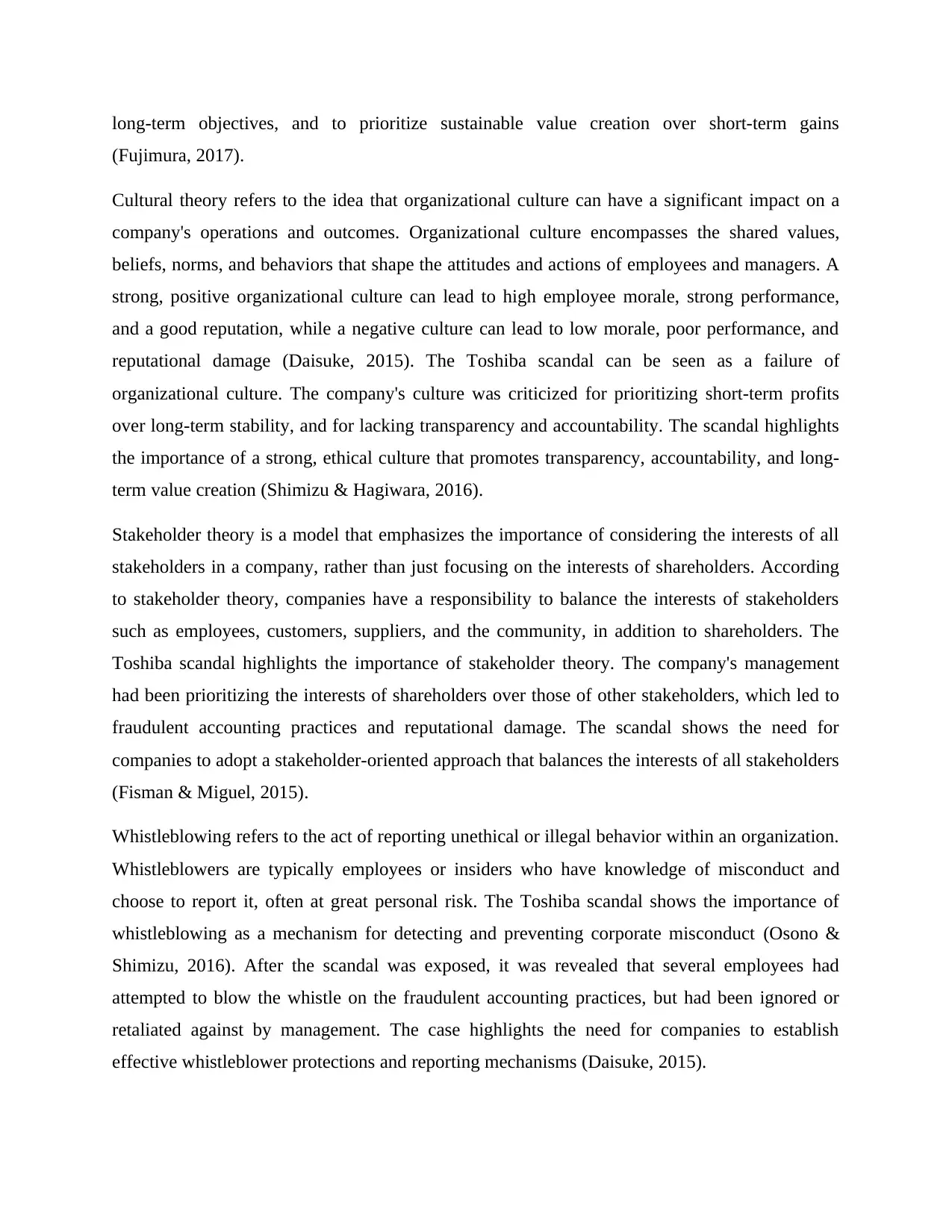
long-term objectives, and to prioritize sustainable value creation over short-term gains
(Fujimura, 2017).
Cultural theory refers to the idea that organizational culture can have a significant impact on a
company's operations and outcomes. Organizational culture encompasses the shared values,
beliefs, norms, and behaviors that shape the attitudes and actions of employees and managers. A
strong, positive organizational culture can lead to high employee morale, strong performance,
and a good reputation, while a negative culture can lead to low morale, poor performance, and
reputational damage (Daisuke, 2015). The Toshiba scandal can be seen as a failure of
organizational culture. The company's culture was criticized for prioritizing short-term profits
over long-term stability, and for lacking transparency and accountability. The scandal highlights
the importance of a strong, ethical culture that promotes transparency, accountability, and long-
term value creation (Shimizu & Hagiwara, 2016).
Stakeholder theory is a model that emphasizes the importance of considering the interests of all
stakeholders in a company, rather than just focusing on the interests of shareholders. According
to stakeholder theory, companies have a responsibility to balance the interests of stakeholders
such as employees, customers, suppliers, and the community, in addition to shareholders. The
Toshiba scandal highlights the importance of stakeholder theory. The company's management
had been prioritizing the interests of shareholders over those of other stakeholders, which led to
fraudulent accounting practices and reputational damage. The scandal shows the need for
companies to adopt a stakeholder-oriented approach that balances the interests of all stakeholders
(Fisman & Miguel, 2015).
Whistleblowing refers to the act of reporting unethical or illegal behavior within an organization.
Whistleblowers are typically employees or insiders who have knowledge of misconduct and
choose to report it, often at great personal risk. The Toshiba scandal shows the importance of
whistleblowing as a mechanism for detecting and preventing corporate misconduct (Osono &
Shimizu, 2016). After the scandal was exposed, it was revealed that several employees had
attempted to blow the whistle on the fraudulent accounting practices, but had been ignored or
retaliated against by management. The case highlights the need for companies to establish
effective whistleblower protections and reporting mechanisms (Daisuke, 2015).
(Fujimura, 2017).
Cultural theory refers to the idea that organizational culture can have a significant impact on a
company's operations and outcomes. Organizational culture encompasses the shared values,
beliefs, norms, and behaviors that shape the attitudes and actions of employees and managers. A
strong, positive organizational culture can lead to high employee morale, strong performance,
and a good reputation, while a negative culture can lead to low morale, poor performance, and
reputational damage (Daisuke, 2015). The Toshiba scandal can be seen as a failure of
organizational culture. The company's culture was criticized for prioritizing short-term profits
over long-term stability, and for lacking transparency and accountability. The scandal highlights
the importance of a strong, ethical culture that promotes transparency, accountability, and long-
term value creation (Shimizu & Hagiwara, 2016).
Stakeholder theory is a model that emphasizes the importance of considering the interests of all
stakeholders in a company, rather than just focusing on the interests of shareholders. According
to stakeholder theory, companies have a responsibility to balance the interests of stakeholders
such as employees, customers, suppliers, and the community, in addition to shareholders. The
Toshiba scandal highlights the importance of stakeholder theory. The company's management
had been prioritizing the interests of shareholders over those of other stakeholders, which led to
fraudulent accounting practices and reputational damage. The scandal shows the need for
companies to adopt a stakeholder-oriented approach that balances the interests of all stakeholders
(Fisman & Miguel, 2015).
Whistleblowing refers to the act of reporting unethical or illegal behavior within an organization.
Whistleblowers are typically employees or insiders who have knowledge of misconduct and
choose to report it, often at great personal risk. The Toshiba scandal shows the importance of
whistleblowing as a mechanism for detecting and preventing corporate misconduct (Osono &
Shimizu, 2016). After the scandal was exposed, it was revealed that several employees had
attempted to blow the whistle on the fraudulent accounting practices, but had been ignored or
retaliated against by management. The case highlights the need for companies to establish
effective whistleblower protections and reporting mechanisms (Daisuke, 2015).
Paraphrase This Document
Need a fresh take? Get an instant paraphrase of this document with our AI Paraphraser
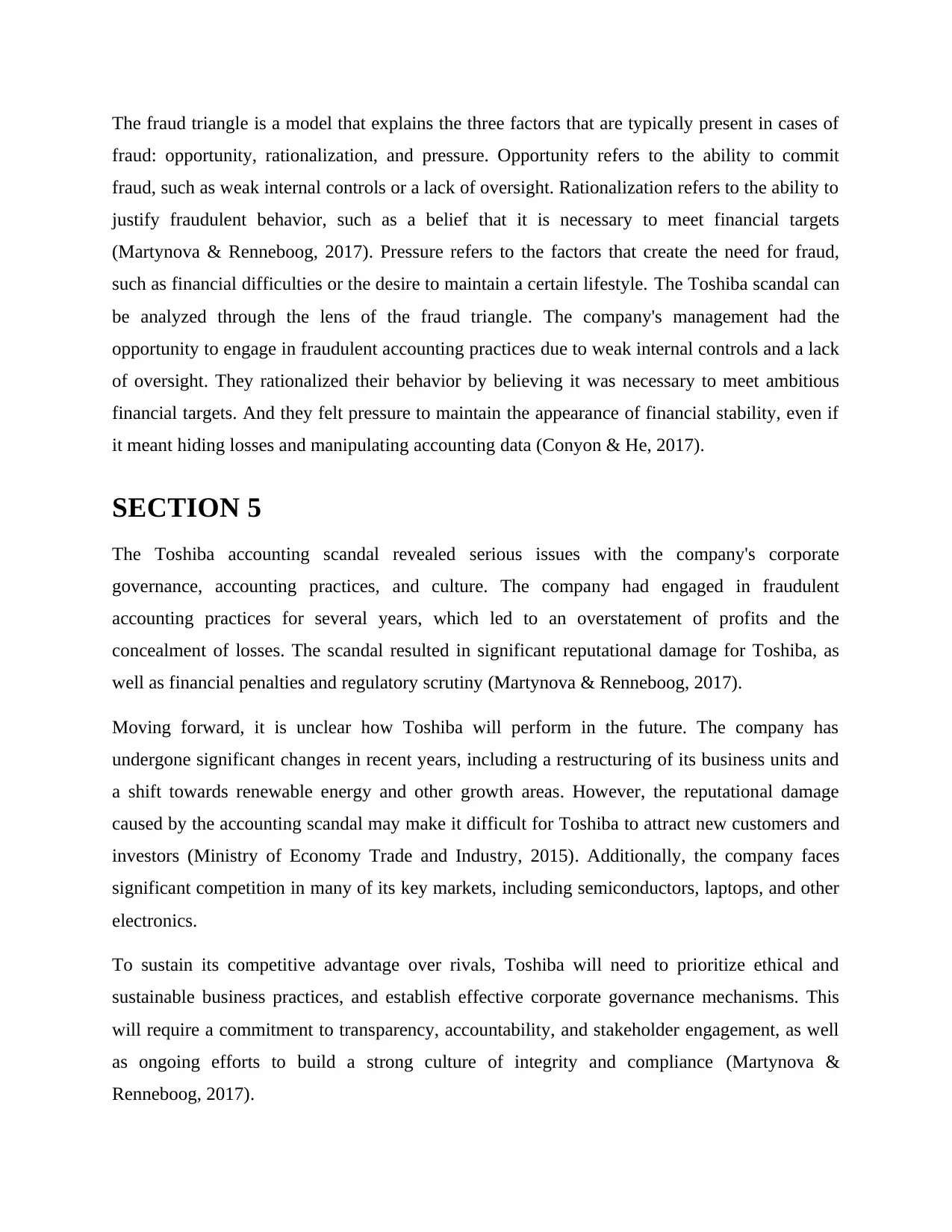
The fraud triangle is a model that explains the three factors that are typically present in cases of
fraud: opportunity, rationalization, and pressure. Opportunity refers to the ability to commit
fraud, such as weak internal controls or a lack of oversight. Rationalization refers to the ability to
justify fraudulent behavior, such as a belief that it is necessary to meet financial targets
(Martynova & Renneboog, 2017). Pressure refers to the factors that create the need for fraud,
such as financial difficulties or the desire to maintain a certain lifestyle. The Toshiba scandal can
be analyzed through the lens of the fraud triangle. The company's management had the
opportunity to engage in fraudulent accounting practices due to weak internal controls and a lack
of oversight. They rationalized their behavior by believing it was necessary to meet ambitious
financial targets. And they felt pressure to maintain the appearance of financial stability, even if
it meant hiding losses and manipulating accounting data (Conyon & He, 2017).
SECTION 5
The Toshiba accounting scandal revealed serious issues with the company's corporate
governance, accounting practices, and culture. The company had engaged in fraudulent
accounting practices for several years, which led to an overstatement of profits and the
concealment of losses. The scandal resulted in significant reputational damage for Toshiba, as
well as financial penalties and regulatory scrutiny (Martynova & Renneboog, 2017).
Moving forward, it is unclear how Toshiba will perform in the future. The company has
undergone significant changes in recent years, including a restructuring of its business units and
a shift towards renewable energy and other growth areas. However, the reputational damage
caused by the accounting scandal may make it difficult for Toshiba to attract new customers and
investors (Ministry of Economy Trade and Industry, 2015). Additionally, the company faces
significant competition in many of its key markets, including semiconductors, laptops, and other
electronics.
To sustain its competitive advantage over rivals, Toshiba will need to prioritize ethical and
sustainable business practices, and establish effective corporate governance mechanisms. This
will require a commitment to transparency, accountability, and stakeholder engagement, as well
as ongoing efforts to build a strong culture of integrity and compliance (Martynova &
Renneboog, 2017).
fraud: opportunity, rationalization, and pressure. Opportunity refers to the ability to commit
fraud, such as weak internal controls or a lack of oversight. Rationalization refers to the ability to
justify fraudulent behavior, such as a belief that it is necessary to meet financial targets
(Martynova & Renneboog, 2017). Pressure refers to the factors that create the need for fraud,
such as financial difficulties or the desire to maintain a certain lifestyle. The Toshiba scandal can
be analyzed through the lens of the fraud triangle. The company's management had the
opportunity to engage in fraudulent accounting practices due to weak internal controls and a lack
of oversight. They rationalized their behavior by believing it was necessary to meet ambitious
financial targets. And they felt pressure to maintain the appearance of financial stability, even if
it meant hiding losses and manipulating accounting data (Conyon & He, 2017).
SECTION 5
The Toshiba accounting scandal revealed serious issues with the company's corporate
governance, accounting practices, and culture. The company had engaged in fraudulent
accounting practices for several years, which led to an overstatement of profits and the
concealment of losses. The scandal resulted in significant reputational damage for Toshiba, as
well as financial penalties and regulatory scrutiny (Martynova & Renneboog, 2017).
Moving forward, it is unclear how Toshiba will perform in the future. The company has
undergone significant changes in recent years, including a restructuring of its business units and
a shift towards renewable energy and other growth areas. However, the reputational damage
caused by the accounting scandal may make it difficult for Toshiba to attract new customers and
investors (Ministry of Economy Trade and Industry, 2015). Additionally, the company faces
significant competition in many of its key markets, including semiconductors, laptops, and other
electronics.
To sustain its competitive advantage over rivals, Toshiba will need to prioritize ethical and
sustainable business practices, and establish effective corporate governance mechanisms. This
will require a commitment to transparency, accountability, and stakeholder engagement, as well
as ongoing efforts to build a strong culture of integrity and compliance (Martynova &
Renneboog, 2017).
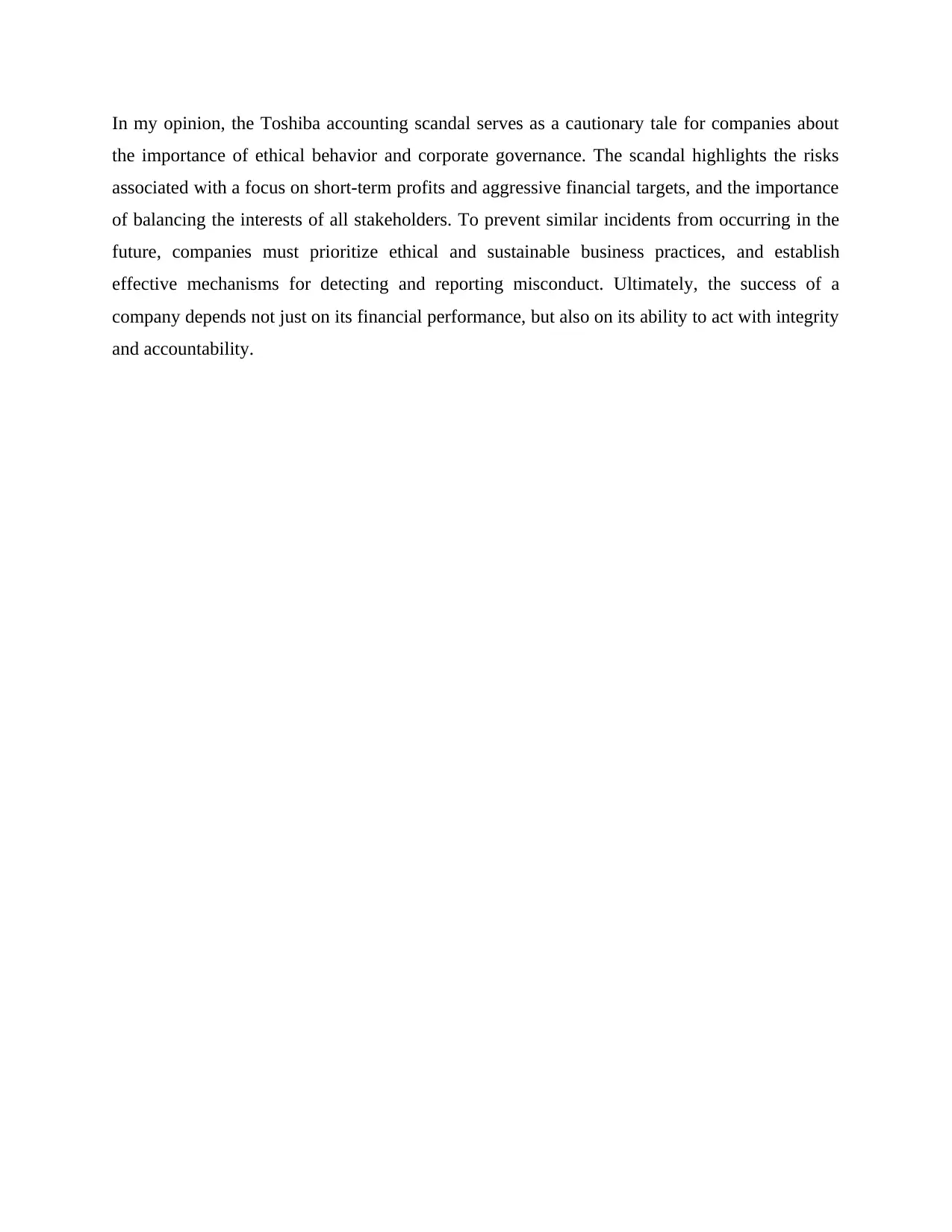
In my opinion, the Toshiba accounting scandal serves as a cautionary tale for companies about
the importance of ethical behavior and corporate governance. The scandal highlights the risks
associated with a focus on short-term profits and aggressive financial targets, and the importance
of balancing the interests of all stakeholders. To prevent similar incidents from occurring in the
future, companies must prioritize ethical and sustainable business practices, and establish
effective mechanisms for detecting and reporting misconduct. Ultimately, the success of a
company depends not just on its financial performance, but also on its ability to act with integrity
and accountability.
the importance of ethical behavior and corporate governance. The scandal highlights the risks
associated with a focus on short-term profits and aggressive financial targets, and the importance
of balancing the interests of all stakeholders. To prevent similar incidents from occurring in the
future, companies must prioritize ethical and sustainable business practices, and establish
effective mechanisms for detecting and reporting misconduct. Ultimately, the success of a
company depends not just on its financial performance, but also on its ability to act with integrity
and accountability.
⊘ This is a preview!⊘
Do you want full access?
Subscribe today to unlock all pages.

Trusted by 1+ million students worldwide
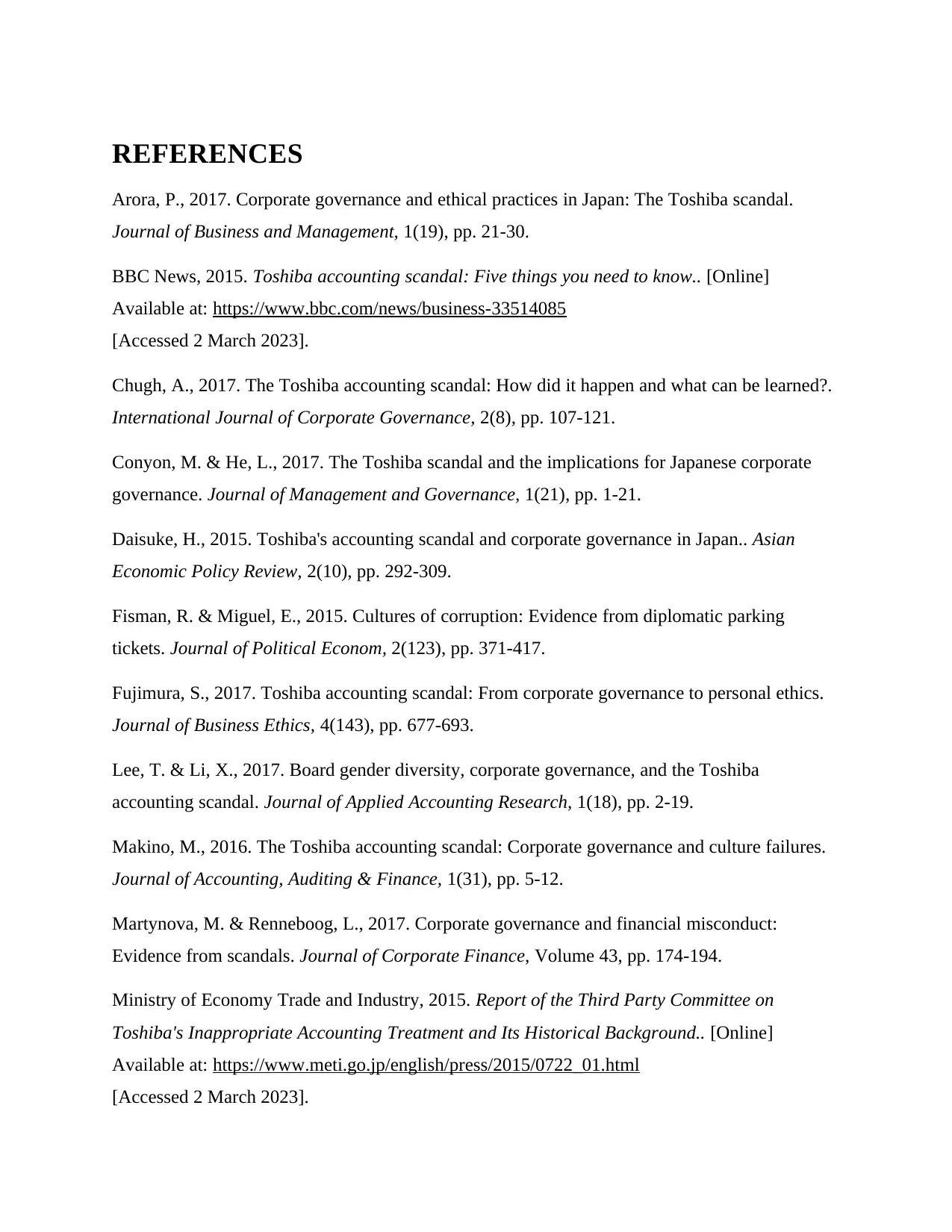
REFERENCES
Arora, P., 2017. Corporate governance and ethical practices in Japan: The Toshiba scandal.
Journal of Business and Management, 1(19), pp. 21-30.
BBC News, 2015. Toshiba accounting scandal: Five things you need to know.. [Online]
Available at: https://www.bbc.com/news/business-33514085
[Accessed 2 March 2023].
Chugh, A., 2017. The Toshiba accounting scandal: How did it happen and what can be learned?.
International Journal of Corporate Governance, 2(8), pp. 107-121.
Conyon, M. & He, L., 2017. The Toshiba scandal and the implications for Japanese corporate
governance. Journal of Management and Governance, 1(21), pp. 1-21.
Daisuke, H., 2015. Toshiba's accounting scandal and corporate governance in Japan.. Asian
Economic Policy Review, 2(10), pp. 292-309.
Fisman, R. & Miguel, E., 2015. Cultures of corruption: Evidence from diplomatic parking
tickets. Journal of Political Econom, 2(123), pp. 371-417.
Fujimura, S., 2017. Toshiba accounting scandal: From corporate governance to personal ethics.
Journal of Business Ethics, 4(143), pp. 677-693.
Lee, T. & Li, X., 2017. Board gender diversity, corporate governance, and the Toshiba
accounting scandal. Journal of Applied Accounting Research, 1(18), pp. 2-19.
Makino, M., 2016. The Toshiba accounting scandal: Corporate governance and culture failures.
Journal of Accounting, Auditing & Finance, 1(31), pp. 5-12.
Martynova, M. & Renneboog, L., 2017. Corporate governance and financial misconduct:
Evidence from scandals. Journal of Corporate Finance, Volume 43, pp. 174-194.
Ministry of Economy Trade and Industry, 2015. Report of the Third Party Committee on
Toshiba's Inappropriate Accounting Treatment and Its Historical Background.. [Online]
Available at: https://www.meti.go.jp/english/press/2015/0722_01.html
[Accessed 2 March 2023].
Arora, P., 2017. Corporate governance and ethical practices in Japan: The Toshiba scandal.
Journal of Business and Management, 1(19), pp. 21-30.
BBC News, 2015. Toshiba accounting scandal: Five things you need to know.. [Online]
Available at: https://www.bbc.com/news/business-33514085
[Accessed 2 March 2023].
Chugh, A., 2017. The Toshiba accounting scandal: How did it happen and what can be learned?.
International Journal of Corporate Governance, 2(8), pp. 107-121.
Conyon, M. & He, L., 2017. The Toshiba scandal and the implications for Japanese corporate
governance. Journal of Management and Governance, 1(21), pp. 1-21.
Daisuke, H., 2015. Toshiba's accounting scandal and corporate governance in Japan.. Asian
Economic Policy Review, 2(10), pp. 292-309.
Fisman, R. & Miguel, E., 2015. Cultures of corruption: Evidence from diplomatic parking
tickets. Journal of Political Econom, 2(123), pp. 371-417.
Fujimura, S., 2017. Toshiba accounting scandal: From corporate governance to personal ethics.
Journal of Business Ethics, 4(143), pp. 677-693.
Lee, T. & Li, X., 2017. Board gender diversity, corporate governance, and the Toshiba
accounting scandal. Journal of Applied Accounting Research, 1(18), pp. 2-19.
Makino, M., 2016. The Toshiba accounting scandal: Corporate governance and culture failures.
Journal of Accounting, Auditing & Finance, 1(31), pp. 5-12.
Martynova, M. & Renneboog, L., 2017. Corporate governance and financial misconduct:
Evidence from scandals. Journal of Corporate Finance, Volume 43, pp. 174-194.
Ministry of Economy Trade and Industry, 2015. Report of the Third Party Committee on
Toshiba's Inappropriate Accounting Treatment and Its Historical Background.. [Online]
Available at: https://www.meti.go.jp/english/press/2015/0722_01.html
[Accessed 2 March 2023].
Paraphrase This Document
Need a fresh take? Get an instant paraphrase of this document with our AI Paraphraser
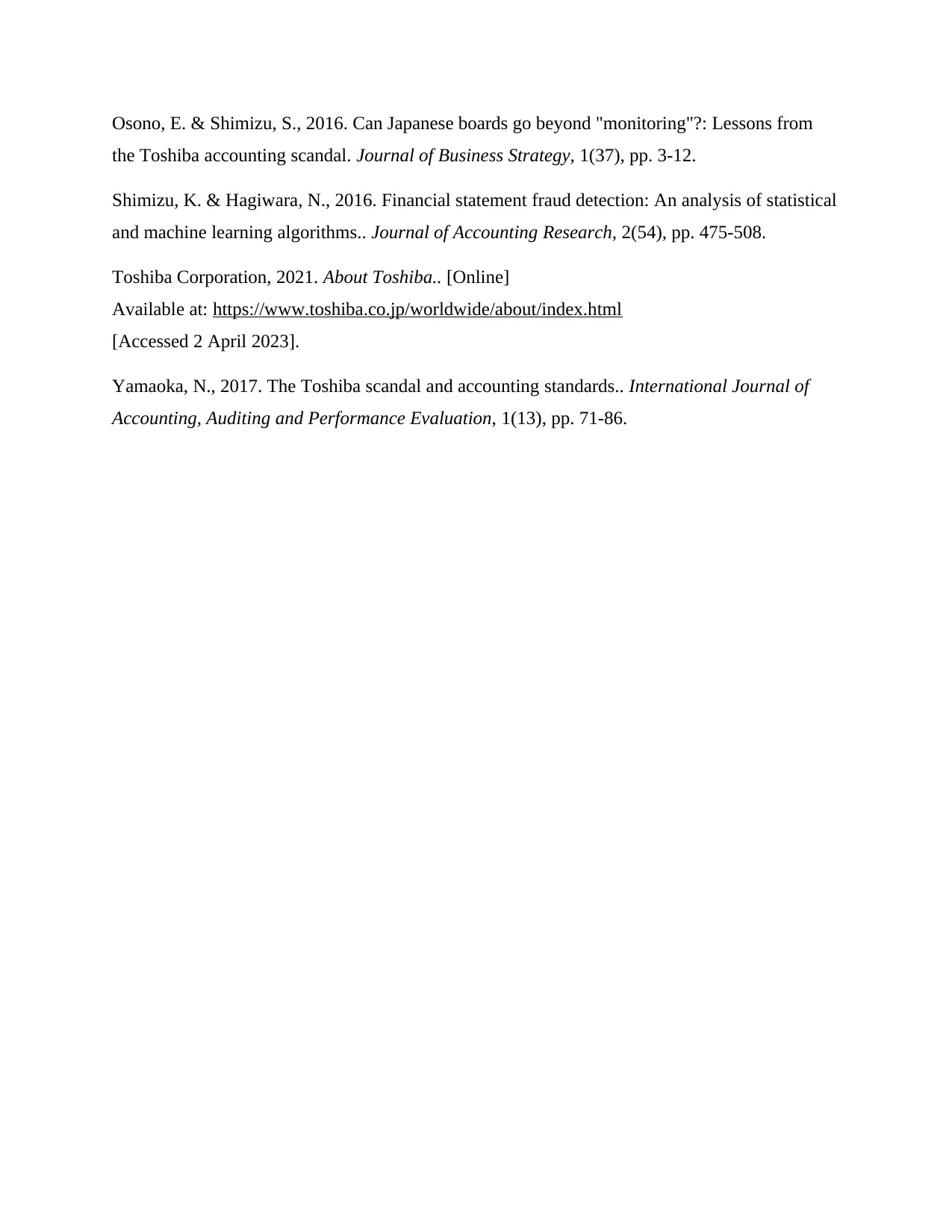
Osono, E. & Shimizu, S., 2016. Can Japanese boards go beyond "monitoring"?: Lessons from
the Toshiba accounting scandal. Journal of Business Strategy, 1(37), pp. 3-12.
Shimizu, K. & Hagiwara, N., 2016. Financial statement fraud detection: An analysis of statistical
and machine learning algorithms.. Journal of Accounting Research, 2(54), pp. 475-508.
Toshiba Corporation, 2021. About Toshiba.. [Online]
Available at: https://www.toshiba.co.jp/worldwide/about/index.html
[Accessed 2 April 2023].
Yamaoka, N., 2017. The Toshiba scandal and accounting standards.. International Journal of
Accounting, Auditing and Performance Evaluation, 1(13), pp. 71-86.
the Toshiba accounting scandal. Journal of Business Strategy, 1(37), pp. 3-12.
Shimizu, K. & Hagiwara, N., 2016. Financial statement fraud detection: An analysis of statistical
and machine learning algorithms.. Journal of Accounting Research, 2(54), pp. 475-508.
Toshiba Corporation, 2021. About Toshiba.. [Online]
Available at: https://www.toshiba.co.jp/worldwide/about/index.html
[Accessed 2 April 2023].
Yamaoka, N., 2017. The Toshiba scandal and accounting standards.. International Journal of
Accounting, Auditing and Performance Evaluation, 1(13), pp. 71-86.
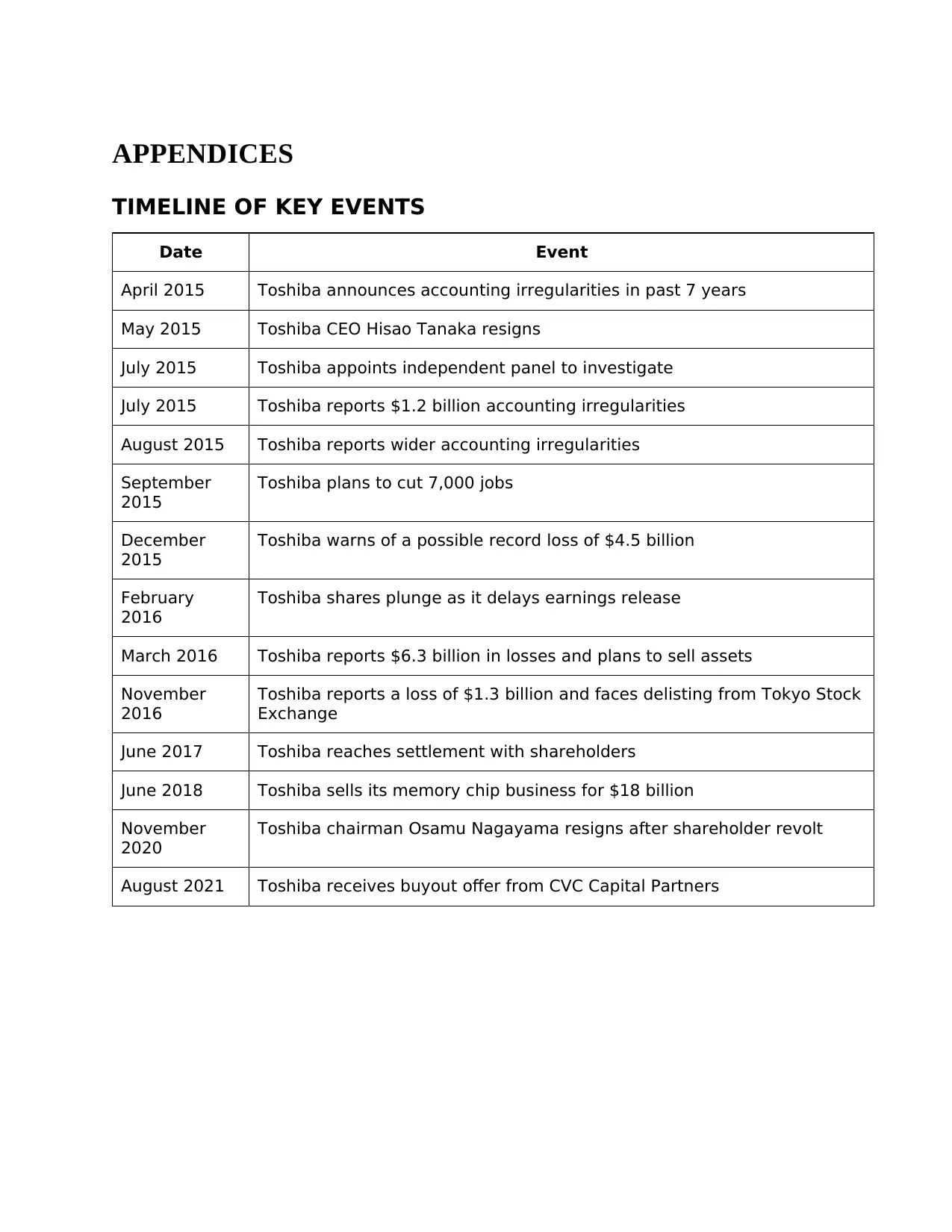
APPENDICES
TIMELINE OF KEY EVENTS
Date Event
April 2015 Toshiba announces accounting irregularities in past 7 years
May 2015 Toshiba CEO Hisao Tanaka resigns
July 2015 Toshiba appoints independent panel to investigate
July 2015 Toshiba reports $1.2 billion accounting irregularities
August 2015 Toshiba reports wider accounting irregularities
September
2015
Toshiba plans to cut 7,000 jobs
December
2015
Toshiba warns of a possible record loss of $4.5 billion
February
2016
Toshiba shares plunge as it delays earnings release
March 2016 Toshiba reports $6.3 billion in losses and plans to sell assets
November
2016
Toshiba reports a loss of $1.3 billion and faces delisting from Tokyo Stock
Exchange
June 2017 Toshiba reaches settlement with shareholders
June 2018 Toshiba sells its memory chip business for $18 billion
November
2020
Toshiba chairman Osamu Nagayama resigns after shareholder revolt
August 2021 Toshiba receives buyout offer from CVC Capital Partners
TIMELINE OF KEY EVENTS
Date Event
April 2015 Toshiba announces accounting irregularities in past 7 years
May 2015 Toshiba CEO Hisao Tanaka resigns
July 2015 Toshiba appoints independent panel to investigate
July 2015 Toshiba reports $1.2 billion accounting irregularities
August 2015 Toshiba reports wider accounting irregularities
September
2015
Toshiba plans to cut 7,000 jobs
December
2015
Toshiba warns of a possible record loss of $4.5 billion
February
2016
Toshiba shares plunge as it delays earnings release
March 2016 Toshiba reports $6.3 billion in losses and plans to sell assets
November
2016
Toshiba reports a loss of $1.3 billion and faces delisting from Tokyo Stock
Exchange
June 2017 Toshiba reaches settlement with shareholders
June 2018 Toshiba sells its memory chip business for $18 billion
November
2020
Toshiba chairman Osamu Nagayama resigns after shareholder revolt
August 2021 Toshiba receives buyout offer from CVC Capital Partners
⊘ This is a preview!⊘
Do you want full access?
Subscribe today to unlock all pages.

Trusted by 1+ million students worldwide
1 out of 14
Related Documents
Your All-in-One AI-Powered Toolkit for Academic Success.
+13062052269
info@desklib.com
Available 24*7 on WhatsApp / Email
![[object Object]](/_next/static/media/star-bottom.7253800d.svg)
Unlock your academic potential
Copyright © 2020–2026 A2Z Services. All Rights Reserved. Developed and managed by ZUCOL.





